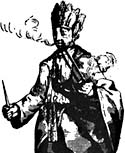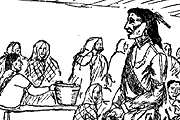Philadelphia Indians
 |
| This engraving represents a Delaware Indian circa 1757. Image © 2002 www.clipart.com. |
| |
 |
| The followers of Handsome Lake's Longhouse religion met much as modern-day support groups do to help each other work through problems. Image © 2002 www.clipart.com. |
The Delaware Indians, or "Lenni Lenape," inhabited Philadelphia when William Penn arrived in 1682. They spoke Algonquin and were concentrated in the Delaware Valley. That’s where their name derived from.
The Delaware and Quakers got along well until 1737. In that year the Delaware honored a false deed contrived by the sons of William Penn to pay off debts. As a result of this event, known as the Walking Purchase, the Delaware gave up a sizeable portion of their lands. Faced with increasing European settlement on one side and Iroquois domination on the other, the Delaware moved west. That greatly cut their presence in Philadelphia.
The Iroquois took over much of what the Delaware abandoned. They remained influential to the end of the 18th century by staying fiercely neutral. Six separate tribes made up the League of the Iroquois. The League had two advantages. Each tribe governed itself, but together all the tribes presented a force when their security was jeopardized. That model is similar to the one the United States followed in its infancy.
The Iroquois prospered until the Revolutionary War. For the most part the war dissolved the Iroquois confederacy. By the time Meriwether Lewis came to Philadelphia in 1803, the Iroquois were a struggling people. At about that time a Seneca warrior had a powerful vision to rescue the Iroquois people.
Handsome Lake realized how far his people had fallen at the hands of European culture. In addition to the Revolutionary War’s weakening of the Iroquois, white man’s alcohol was now robbing them of their pride and dignity. To battle all of that, Handsome Lake founded the Longhouse religion. It promoted clean living, asking followers to be "sober, honest, industrious, and good."
The movement was a surprising success. President Jefferson even invited Handsome Lake to the nation’s capitol to recognize the warrior’s work.
< previous | next > | 


